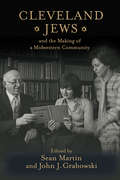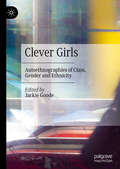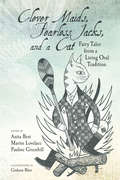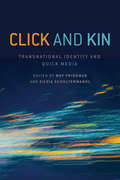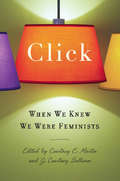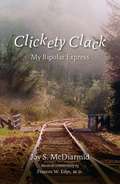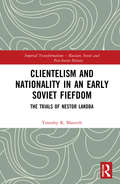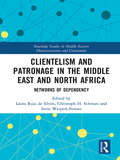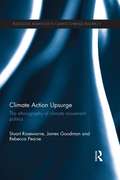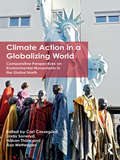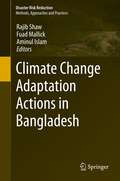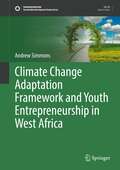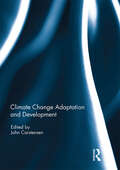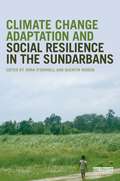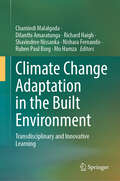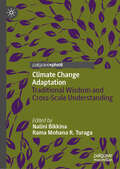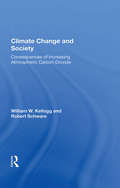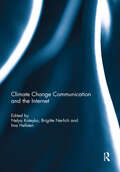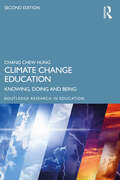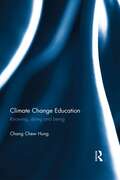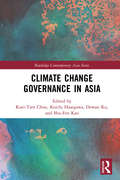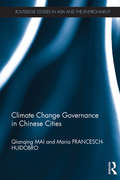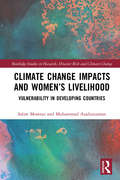- Table View
- List View
Cleveland Jews and the Making of a Midwestern Community
by Ira Robinson Shaul Kelner Eli Lederhendler Samantha Baskind Sylvia F. Abrams Rachel Gordan Todd Michney Zohar Segev Mary McCune Mark SoutherThis volume gathers an array of voices to tell the stories of Cleveland’s twentieth century Jewish community. Strong and stable after an often turbulent century, the Jews of Cleveland had both deep ties in the region and an evolving and dynamic commitment to Jewish life. The authors present the views and actions of community leaders and everyday Jews who embodied that commitment in their religious participation, educational efforts, philanthropic endeavors, and in their simple desire to live next to each other in the city’s eastern suburbs. The twentieth century saw the move of Cleveland’s Jews out of the center of the city, a move that only served to increase the density of Jewish life. The essays collected here draw heavily on local archival materials and present the area’s Jewish past within the context of American and American Jewish studies.
Cleveland's Gospel Music (Black America Series)
by Frederick BurtonCleveland's Gospel Music documents the history of black gospel music from the 1920s through the 1980s. The gospel quartet groups, radio announcers, solo artists, and promoters established Cleveland as the gospel singers' metropolitan hub. An integral part of Cleveland's history and its rich African-American community, gospel singers didn't sing for money or fame, but sang to the glory of God, often beyond the point of exhaustion. This work is a celebration of the past praises of those who sang tirelessly for some 60 years.
Clever Girls: Autoethnographies of Class, Gender and Ethnicity
by Jackie GoodeThis collection by three generations of women from predominantly working-class backgrounds explores the production of the classed, gendered and racialized subject with powerful, engaging, funny and moving stories of transitions through family relationships, education, friendships and work. The developments that take place across a life in processes of ‘becoming’ are examined through the fifteen autoethnographies that form the core of the book, set within an elaboration of the social, educational and geo-political developments that constitute the backdrop to contributors’ lives. Clever Girls discusses the status of personal experience as ‘research data’ and the memory work that goes into the making of autoethnography-as-poiesis. The collection illustrates the huge potential of autoethnography as research method, mode of inquiry and creative practice to illuminate the specificities and commonalities of experiences of growing up as ‘clever girls’ and to sound a ‘call to action’ against inequality and discrimination.
Clever Little Books: Martial’s Epigrams and Sexual Knowledge in Early Modern Europe
by Ian Frederick MoultonClever Little Books explores the role of Latin commentaries on the Roman poet Martial as a medium for the transmission of sexual knowledge among male elites in early modern Europe. Valued for its wit and concision, Martial’s sometimes shocking poetry was highly regarded in early modern humanist culture, and editions with detailed scholarly commentary circulated widely. Clever Little Books explores how unexpurgated editions of Martial’s poetry created a significant cultural space for discourse on illicit and non-procreative sexual practices in the early modern period. The early modern commentaries give detailed information on all aspects of sexuality described in the poems, and they constitute a fundamental site of encounter of the early modern period with the world of antiquity. Drawing on early modern scholarly discourse around canonical Latin poetry, as well as handwritten marginal commentary by individual readers such as the English playwright Ben Jonson, Ian Frederick Moulton traces the conflict between ancient sexual mores and the sexual culture and traditions of Renaissance Europe, including later attempts to censor Martial’s texts. By focusing on the sexual knowledge transmitted through editions of Martial, Clever Little Books sheds light on an overlooked but important aspect of early modern sexual discourses, attitudes, and knowledge.
Clever Maids, Fearless Jacks, and a Cat: Fairy Tales from a Living Oral Tradition
by Pauline Greenhill Anita Best Martin LovelaceClever Maids, Fearless Jacks, and a Cat showcases the stories of two Newfoundland storytellers, Philip Pius Power and Alice Lannon. Ethnopoetic transcriptions of these sensitive and artful tales, which have been passed on orally for generations as part of a community tradition, give accounts of living oral performances from the last quarter of the twentieth century and demonstrate the artistry that is possible without the written word. Here, eight tales from Power and five tales from Lannon take up issues of vital concern—such as spousal abuse, bullying, and social and generational conflict—allusively, through a screen of fiction. In commentary following the stories Anita Best, Martin Lovelace, and Pauline Greenhill discuss the transmission of fairy tales in oral tradition, address the relation of these magic tales to Lannon’s and Power’s other stories, and share specifics about Newfoundland storytelling and the two tellers themselves. The text is further enriched by expressive illustrations from artist Graham Blair. Clever Maids, Fearless Jacks, and a Cat presents the fairy-tale oeuvres of two superb storytellers as a contribution to interdisciplinary fairy-tale studies and folklore—countering fairy-tale studies’ focus on written traditions and printed texts—as well as to gender studies, cultural studies, Newfoundland studies, and Canadian studies. Students, scholars, and general readers interested in folk and fairy tales, contemporary Märchen, Newfoundland folklore, or oral tradition more generally will find much of value in these pages. Support for this publication was provided, in part, by the University of Winnipeg.
Click and Kin: Transnational Identity and Quick Media
by May Friedman Silvia SchultermandlClick and Kin is an interdisciplinary examination of how our increasingly mobile and networked age is changing the experience of kinship and connection. Focusing on how identity formation is affected by quick media such as instant messaging, video chat, and social networks, the contributors to this collection use ethnographic and textual analyses, as well as autobiographical approaches, to demonstrate the ways in which the ability to communicate across national boundaries is transforming how we grow together and apart as families, communities, and nations. The essays in Click and Kin span the globe, examining transnational connections that touch in the United States, Canada, Mexico, India, Pakistan, and elsewhere. Together, they offer a unique reflection on the intersection of new media, identity politics, and kinship in the twenty-first century.
Click: When We Knew We Were Feminists
by J. Courtney Sullivan Courtney E. MartinWhen did you know you were a feminist? Whether it happened at school, at work, while watching TV, or reading a book, many of us can point to a particular moment when we knew we were feminists. In Click, editors Courtney E. Martin and J. Courtney Sullivan bring us a range of women-including Jessica Valenti, Amy Richards, Shelby Knox, Winter Miller, and Jennifer Baumgardner-who share stories about how that moment took shape for them.Sometimes emotional, sometimes hilarious, this collection gives young women who already identify with the feminist movement the opportunity to be heard-and it welcomes into the fold those new to the still-developing story of feminism.
Clickety Clack: My Bipolar Express
by Joy S. McdiarmidClickety Clack is Joy McDiarmid’s self- portrait of bipolar mental illness and one of the most ambiguous sexual identities imaginable for a woman coming of age in the 1950s. Amidst gender and sexuality confusion, this Winnipeg woman began to look for romantic love and sexual fulfillment: sometimes wanting to dress as a man, sometimes as a woman, sometimes attracted to men, sometimes to women. In candid accounts of this paralysing complexity, which McDiarmid tried valiantly to understand and express despite oppressive social stigmas and parental strictures, her insights about human sexuality and "living the lie" are startling even in this age of open commentary about sex. Along primitive frontiers of treatment for bipolar disorders and dramas of shock therapy in psychiatric wards, entire years of McDiarmid’s life would slip by even as earlier years were being erased from her memory. Yet there came triumphant accomplishments in her competitive and stimulating world of advertising, university work, private enterprise, photography, travel, touring in her MG sports car, skilful tennis, and love. Such juxtaposed experiences of despair and defiant courage, supplemented at the end of each chapter with medical commentary by Joy’s psychiatrist Dr. Frances Edye, make Clickety Clack a rare road map to life.
Clientelism and Nationality in an Early Soviet Fiefdom: The Trials of Nestor Lakoba (Imperial Transformations – Russian, Soviet and Post-Soviet History)
by Timothy K. BlauveltBased on extensive original research, this book tells the astonishing story of early Soviet Abkhazia and of its leader, the charismatic Bolshevik revolutionary Nestor Lakoba. A tiny republic on the Black Sea coast of the USSR, Abkhazia became a vacation retreat for Party leaders and a major producer of tobacco. Nestor Lakoba became the unquestioned boss of Abkhazia, constructing a powerful local ethnic "machine" that became an influential component of Soviet patronage politics, provoking along the way accusations of nepotism, corruption, blood feuds, embezzlement, racketeering, and extrajudicial murder on a scale that shocked even hardened Communist Party investigators. Lakoba and his group faced a series of trials, investigatory commissions, and tribunals over allegations of malfeasance, yet they were repeatedly able to convince their powerful patrons of their irreplaceability, until at last they were destroyed through a public show trial during the peak of the Stalinist Terror. Through the prism of tiny Abkhazia, this book provides invaluable insights into the nature of the early Soviet system and the governance of Soviet national republics.
Clientelism and Patronage in the Middle East and North Africa: Networks of Dependency (Routledge Studies in Middle Eastern Democratization and Government)
by Laura Ruiz de Elvira Christoph H. Schwarz Irene Weipert-FennerOne common demand in the 2011 uprisings in the MENA region was the call for ‘freedom, dignity, and social justice.’ Citizens rallied against corruption and clientelism, which for many protesters were deeply linked to political tyranny. This book takes the phenomenon of the 2011 uprisings as a point of departure for reassessing clientelism and patronage across the entire MENA region. Using case studies covering Morocco, Tunisia, Egypt, Jordan, Lebanon, Turkey and the Gulf monarchies, it looks at how the relationships within and between clientelist and patronage networks changed before 2011. The book assesses how these changes contributed to the destabilization of the established political and social order, and how they affected less visible political processes. It then turns to look at how the political transformations since 2011 have in turn reconfigured these networks in terms of strategies and dynamics, and concomitantly, what implications this has had for the inclusion or exclusion of new actors. Are specific networks expanding or shrinking in the post-2011 contexts? Do these networks reproduce established forms of patron-client relations or do they translate into new modes and mechanisms? As the first book to systematically discuss clientelism, patronage and corruption against the background of the 2011 uprisings, it will be a valuable resource for students and scholars of Middle Eastern Studies. The book also addresses major debates in comparative politics and political sociology by offering ‘networks of dependency’ as an interdisciplinary conceptual approach that can ‘travel’ across place and time.
Climate Action Upsurge: The Ethnography of Climate Movement Politics (Routledge Advances in Climate Change Research)
by James Goodman Rebecca Pearse Stuart RosewarneIn the late 2000s climate action became a defining feature of the international political agenda. Evidence of global warming and accelerating greenhouse gas emissions created a new sense of urgency and, despite consensus on the need for action, the growing failure of international climate policy engendered new political space for social movements. By 2007 a ‘climate justice’ movement was surfacing and developing a strong critique of existing official climate policies and engaging in new forms of direct action to assert the need for reduced extraction and burning of fossil fuels. Climate Action Upsurge offers an insight into this important period in climate movement politics, drawing on the perspectives of activists who were directly engaged in the mobilisation process. Through the interpretation of these perspectives the book illustrates important lessons for the climate movement today. In developing its examination of the climate action upsurge, the book focuses on individual activists involved in direct action ‘Climate Camps’ in Australia, while drawing comparisons and highlighting links with climate campaigns in other locales. The book should be of interest to scholars and researchers in climate change, environmental sociology, politics, policy and activism.
Climate Action in a Globalizing World: Comparative Perspectives on Environmental Movements in the Global North
by Asa Wettergren Carl Cassegard Hakan Thorn Linda SonerydThe existence and urgency of global climate change is a matter of scientific consensus. Yet the global politics of climate change have been anything but consensual. In this context, a wave of global climate activism has emerged in the last decade in response to the perceived failure of the political negotiations. This book provides a unique comparative study of environmental movements in USA, Japan, Denmark and Sweden, analyzing their interaction with the international climate institutions of the United Nations, with national governments, and with currents in the global climate movement. It documents how and why the movement evolved between the Copenhagen Summit of 2009 and the Paris Summit of 2015, altering its strategies and tactics while attracting new actors to the issue area. Further, it demonstrates how the development of global environmental networks has increased contact between environmental movements in the Global North and those from the Global South, resulting in the establishment of ‘climate justice’ as a political cause and unifying frame for global climate activism.
Climate Change Adaptation Actions in Bangladesh (Disaster Risk Reduction)
by Rajib Shaw Aminul Islam Fuad MallickThe book outlines the climate change adaptation (CCA) actions in Bangladesh drawing examples and lessons from different projects and programs in the country. The content is based on a selection of available documents, a consultative workshop with the academicians from different universities undertaking higher education on disaster risk reduction and climate change adaptation, and the editors' own knowledge and experience in the field. The book has four parts. Part I gives the details of climate change impacts, providing the scenarios, negotiations, and specific impacts on sea-level rise and the health sectors. Part II focuses on climate change strategy and action plans. Part III covers socio-economic impacts in terms of economic and environmental costs. Part IV focuses on adaptive actions for agriculture, livelihoods, and integrated approaches in agriculture and fisheries. Part V deals with climate-change governance issues. The primary target groups for this book are students and researchers in the fields of environment, disaster risk reduction, and climate change studies. The book will provide them with a good idea of the current trend of research in the field and will furnish basic knowledge on this important topic in Bangladesh. Another target group comprises practitioners and policy makers, who will be able to apply collective knowledge to policy and decision making.
Climate Change Adaptation Framework and Youth Entrepreneurship in West Africa (Sustainable Development Goals Series)
by Andrew SimmonsThis book's purpose is to highlight the development challenges and successes of implementing the Youth Climate Change Adaptation Development Framework in Sierra Leone, West Africa. Over the past decade, Sierra Leone has experienced a series of development challenges, including internal conflict and Ebola outbreaks in most recent times. The dire unemployment situation in Sierra Leone is compounded by the emergence of climate change that negatively impacts all aspects of daily life and wellbeing, and the education and training provided do not prepare young people adequately for the job market. Therefore, building youth resilience to adapt to the impact of climate change and other development problems is a significant development challenge faced by policymakers in Sierra Leone. The government, through funding from the African Development Bank (AfDB), has provided support for the implementation of a Youth Employment and Entrepreneurship Project (YEEP) to reinforce the employability of Sierra Leone Youth as well as enhance their entrepreneurship and employment skills through the development of a framework that integrates education and vocational institutions with job market demand and supply. This approach has resulted in strengthening the occupational levels in the youth population segments of the country. This book discusses the objectives and outcomes of this project, including curricula for Sustainable Construction, training of counselors and administrators, providing youths with supervisory skills, and developing tools to assess youth development institutions' weaknesses and enhance institutional capacity to deliver climate change adaption for sustainable development programmes. The book can be used by policymakers from Small Island Developing States (SIDS) and LDCs in Africa and Asia. It can be used by researchers working on Climate Change, Education, Sustainable Development, emphasising Climate Change Education for Sustainable Development in both developing and developed countries. It can also be used by practitioners involved in implementing innovations in youth development, employment, entrepreneurship, sustainable livelihoods initiatives, climate change adaptation, and mitigation. These practitioners and researchers would find this book an invaluable resource to support their work in the field.
Climate Change Adaptation and Development
by John CarstensenClimate change is real and it is man-made. We have put so many greenhouse gas pollutants into the atmosphere that we will see significant and long-term change that we need to adapt and adjust to. It is important for development practitioners to understand these impacts and the challenge of how and when to adapt to climate change.There are plenty of grim presentations of what the extremes of the possible climate scenarios will throw at us over the next 100 years, but not all change will be disastrous; some change will be beneficial, but much of the change will happen at an unprecedented rate that will require the best possible analysis and understanding of how and when we should adapt to climate change.This is important for development practitioners as we invest in ensuring that poverty is reduced and eliminated and the well-being of everyone is improved. Many countries and communities around the world are vulnerable to the impacts of climate change, but developing economies may on one hand be less resilient to the impact, but could on the other hand be in a better position to make their development climate smart by making the most efficient use of their economic resources.The chapters in this book shine a light on the complexity and the multi-dimensional aspects of climate change adaptation. They gather some of the experiences of addressing climate change impacts in a development context. This book was previously published as a special issue of Development in Practice.
Climate Change Adaptation and Social Resilience in the Sundarbans
by Quentin Wodon Anna O'DonnellHousehold vulnerability to weather shocks and changing climatic conditions has become a major concern in developing countries. Yet the empirical evidence remains limited on the impact that changing environmental conditions have on households. This book explores climate change adaptation using a social resilience approach. The book is based on primary data from the Sundarbans, a densely populated area located across parts of Bangladesh and India (West Bengal) which is highly vulnerable to extreme weather events and climate change. The focus is on assessing how households are affected by cyclones: whether they are able to cope with, adapt to and recover from events and changes; whether they are warned ahead of time; whether they benefit from government safety nets and other social programs; and finally whether they are driven to either temporary or permanent migration. This assessment leads to a better understanding of how exposure to an area of climate change vulnerability and risk affects and shapes human responses.
Climate Change Adaptation in the Built Environment: Transdisciplinary and Innovative Learning
by Dilanthi Amaratunga Richard Haigh Mo Hamza Chamindi Malalgoda Shavindree Nissanka Nishara Fernando Ruben Paul BorgGlobal climate change is one of the greatest environmental threats facing humanity and it is affecting every country on every continent. Recent evidence confirms a close liaison between climate change induced hazards and the built environment, as the built environment demonstrates a high fragility and vulnerability to hazardous situations. The impact of climate change is particularly pertinent to the built environment given the life expectancy of buildings and the fact that it is essential to adapt the existing built environment to deal with a climate that may be significantly different from that in which it evolved. Coastal regions are highly vulnerable to climate change because, in addition to changes in temperature, precipitation, and more frequent flooding, they will be affected by rising sea levels, wave heights, and accelerated coastal erosion. The built environment exerts considerable influence over coastal communities' local climate and environment. Coastal areas also tend to be highly populated, with many vulnerable urban centres located near the coastal belt. In addressing such challenges, it is important to better understand the impacts of climate change on the built environment and to develop tangible climate adaptation measures for the built environment.
Climate Change Adaptation: Traditional Wisdom and Cross-Scale Understanding
by Nalini Bikkina Rama Mohana R. TuragaThis book discusses how climate change needs to be anchored in indigenous knowledge with reference to resource management, infrastructure, livelihoods, and social institutions, with a unique focus on risks and provenances of resilience available to the local communities. Beyond the scientific know-how on climate change, this volume highlights traditional wisdom, which through its hands-on learning plays a crucial role in amalgamation with cross-scale understanding. It documents the deliberations of a seminar that brought together traditional wisdom and cross-scale understanding of academicians, researchers, practitioners, and grassroots functionaries directly or indirectly working with communities in the area of climate change adaptation and thereby brings together adaptation and allied practices from across a spectrum of specialties and practitioner contexts. It discusses several insights and novel practices and is purported to provide significant research and policy implications in the spirit of thinking globally but acting locally.
Climate Change And Society: Consequences Of Increasing Atmospheric Carbon Dioxide
by William W. KelloggAs man's ability to disrupt the climate becomes increasingly apparent,evidence is mounting that human-activity-induced climate changes may well rival anything nature can produce. If the consensus of the international climatological community is correct, and if worldwide use of fossil fuel continues to increase atmospheric carbon dioxide, mankind is
Climate Change Communication and the Internet
by Nelya Koteyko, Brigitte Nerlich and Iina HellstenThe volume provides a timely, state of the art collection of studies examining climate change communication in the era of digital media. The chapters focus on a broad range of topics covering various aspects of both practice and research in climate change communication, ranging from the use of online platforms, to blogs, and social networking sites. Climate change communication has increasingly moved into Internet-based forums, and this volume provides a comprehensive overview of research into Internet and climate change communication. The studies share valuable methodological insights in this relatively new field of research and shed light on the opportunities and challenges underlying the collection and analysis of online climate change-related data. This book was previously published as a special issue of Environmental Communication.
Climate Change Education: Knowing, Doing and Being (Routledge Research in Education)
by Chang Chew HungClimate change is complex and there is a need to educate our future generations so that they are able to deal with the plethora of information and views that they come into contact with in their lives. This book inquires into what it means to teach and learn about climate change. Now in its second edition, Chang further explores what education for climate change entails, discussing the concept of climate change education (CCE) itself, how it is taught in schools and how public education is being carried out. Featuring updated literature in a quickly advancing field, the book defines CCE for the global citizen and looks at pedagogies supporting CCE. It also identifies teachers as key stakeholders in climate change discourse, how to improve teacher readiness on the topic and how teacher professional development can support successful implementation of CCE. This book will be invaluable to climate change educators and can act as a reference resource for teachers, education policymakers and public education agencies.
Climate Change Education: Knowing, doing and being (Routledge Research in Education)
by Chang Chew HungClimate change is a controversial topic; some people assert that climate change is not occurring, and others believe that reports are inaccurate, that whilst climate change is happening, it may not be caused by human activity. There are also climate alarmists who use IPCC reports to support their claims that erratic weather patterns are a result of climate change caused by human activity. Regardless of these different viewpoints, one fact can be agreed upon; climate change is a complex subject and there is a need to educate future generations, enabling them to deal with the plethora of information and views that they will experience in their lives. This book explores what education for climate change entails, discussing the concept of Climate Change Education (CCE) itself, how it can be taught in schools and how public education can be carried out. It instructs what specific subject matter to teach for CCE, and how to evaluate the student learning on the subject. Chapters include: CCE in the Formal Curriculum Teacher readiness for CCE Assessment for and of CCE Lessons from CCE for Public Education Climate Change Education is an extremely useful resource for anyone involved in educating students on climate change and also for those interested in climate change itself.
Climate Change Governance in Asia (Routledge Contemporary Asia Series)
by Kuei-Tien Chou Koichi Hasegawa Dowan Ku Shu-Fen KaoAsian countries are among the largest contributors to climate change. China, India, Japan and South Korea are among the top ten largest carbon emitters in the world, with South Korea, Japan and Taiwan also some of the largest on a per capita basis. At the same time, many Asian countries, notably India, Taiwan, Japan, the Philippines and Thailand are among those most affected by climate change, in terms of economic losses attributed to climate-related disasters. Asia is an extremely diverse region, in terms of the political regimes of its constituent countries, and of their level of development and the nature of their civil societies. As such, its countries are producing a wide range of governance approaches to climate change. Covering the diversity of climate change governance in Asia, this book presents cosmopolitan governance from the perspective of urban and rural communities, local and central governments, state-society relations and international relations. In doing so it offers both a valuable overview of individual Asian countries’ approaches to climate change governance, and a series of case studies for finding solutions to climate change challenges.
Climate Change Governance in Chinese Cities (Routledge Studies in Asia and the Environment)
by Qianqing Mai Maria Francesch-HuidobroIn the last thirty years, China has experienced rapid economic development and urbanisation which has resulted in high levels of environmental degradation and has put considerable pressure on the country’s infrastructure and natural resources. As China commits to considerably lower the carbon intensity of its economy, this volume analyses and explains the governance of climate change mitigation responses in major Chinese cities. The book focuses specifically on two highly carbon intensive sectors, buildings and transport, in Guangzhou, Shenzhen, and Hong Kong to explore how collaborative municipal networks function in practice in Chinese cities. The authors find that effective coordination relies on the political will of local administrative elites, the political significance attached to climate change issues, the legitimate authority granted to the coordinating agency, and human and financial capitals. Collaboration is hampered by limited span of network engagement, inadequate authority of the primary network participants, insufficient input and output legitimacy of the sectoral innovations, and missing linkages across functionally segregated sectors. The book concludes that the enhanced collaboration and coordination between networks that has emerged in the process of low carbon transitions is transforming the Chinese environmental state into a more pluralistic, inclusive and legitimate one. This book will be of interest to researchers and practitioners across disciplines including Chinese studies, environmental politics and policy, urban studies, and planning and geography.
Climate Change Impacts and Women’s Livelihood: Vulnerability in Developing Countries (Routledge Studies in Hazards, Disaster Risk and Climate Change)
by Salim Momtaz Muhammad AsaduzzamanVery few studies have been conducted to explore the vulnerability of women in the context of climate change. This book addresses this absence by investigating the structure of women’s livelihoods and coping capacity in a disaster vulnerable coastal area of Bangladesh. The research findings suggest that the distribution of livelihood capitals of vulnerable women in rural Bangladesh is heavily influenced by several climatic events, such as cyclones, floods and seasonal droughts that periodically affect the region. Women face several challenges in their livelihoods, including vulnerability to their income, household assets, lives and health, food security, education, water sources, sanitation and transportation systems, because of ongoing climate change impacts. The findings have important policy relevance for all involved in disaster and risk management, both within Bangladesh and the developing countries facing climate change impacts. Based on the research findings, the book also provides recommendations to improving the livelihoods of women in the coastal communities. This book will appeal to academics, researchers and professionals in environmental management, gender and development, and climate change governance looking at the effects of and adaptation to climate change, gender issues and natural disaster management strategies.
